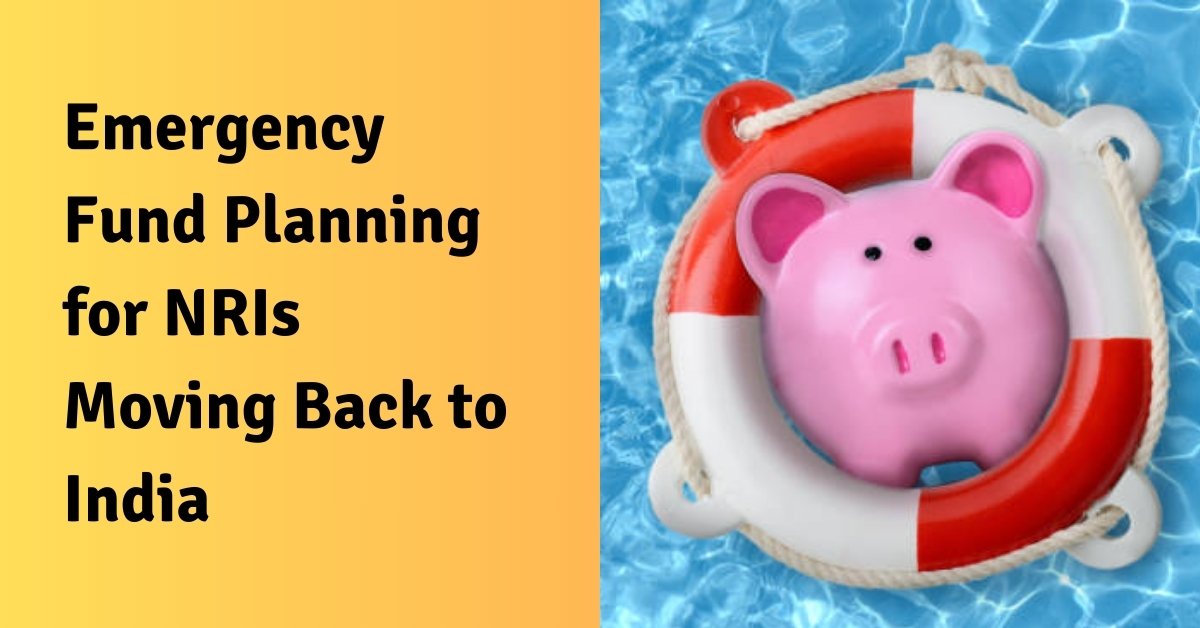As a Non-Resident Indian (NRI) planning to move back to India, one of the most crucial aspects of your financial planning is creating an emergency fund. An emergency fund is a safety net that helps you navigate unexpected financial challenges without derailing your long-term goals. In this blog post, we will explore the importance of emergency fund planning for NRIs moving back to India and provide practical tips to help you build a robust financial cushion.
Why is an Emergency Fund Essential?
An emergency fund is a sum of money set aside to cover unforeseen expenses or financial emergencies. When you move back to India, you may face various financial uncertainties, such as job loss, medical emergencies, or unexpected repairs. Having an emergency fund provides a buffer against these financial shocks, allowing you to maintain financial stability and peace of mind during challenging times.
Assessing Your Emergency Fund Needs
The first step in emergency fund planning is to assess your specific needs. As an NRI moving back to India, consider factors such as your living expenses, family size, health insurance coverage, and potential relocation costs. A general rule of thumb is to save three to six months’ worth of living expenses in your emergency fund. However, depending on your unique circumstances, you may need to save more.
Identifying Your Monthly Expenses
To determine the appropriate size of your emergency fund, start by identifying your monthly expenses in India. Consider essential costs such as housing, food, transportation, utilities, and insurance premiums. Don’t forget to account for any additional expenses specific to your situation, such as education costs for children or support for elderly parents. Having a clear understanding of your monthly expenses will help you set a realistic target for your emergency fund.
Building Your Emergency Fund
Once you have assessed your needs and identified your monthly expenses, it’s time to start building your emergency fund. Here are some strategies to help you save effectively:
1. Set a budget: Create a budget that allocates a portion of your income toward your emergency fund. Trim unnecessary expenses and prioritize saving until you reach your target amount.
2. Automate your savings: Set up automatic transfers from your salary account to a dedicated emergency fund account. This ensures that you consistently save without having to make conscious decisions each month.
3. Utilize windfall income: If you receive any windfall income, such as a bonus, tax refund, or inheritance, consider allocating a portion of it to your emergency fund.
4. Start small and grow gradually: If saving a large amount seems daunting, start with a smaller goal and gradually increase your contributions as your financial situation improves.
Choosing the Right Investment Vehicle
When it comes to storing your emergency fund, choose an investment vehicle that offers liquidity, safety, and easy access to your money. Some suitable options for NRIs in India include:
1. Savings account: A high-yield savings account offers liquidity and easy access to your funds. Look for accounts with competitive interest rates and minimal fees.
2. Liquid mutual funds: Liquid mutual funds invest in short-term debt instruments and provide higher returns than savings accounts while maintaining liquidity.
3. Short-term fixed deposits: Fixed deposits with shorter tenures (e.g., 1-3 months) offer guaranteed returns and can be easily liquidated in case of an emergency.
Avoid investing your emergency fund in volatile or illiquid assets such as stocks or real estate, as you may need quick access to your money during a financial crisis.
Reviewing and Replenishing Your Emergency Fund
Building an emergency fund is not a one-time task. Regularly review your fund to ensure it aligns with your changing financial circumstances. If you withdraw money from your emergency fund, make it a priority to replenish it as soon as possible. Treat your emergency fund as a sacred asset and avoid using it for non-emergency expenses.
Seeking Professional Advice
Navigating the financial landscape as an NRI moving back to India can be complex. Consider seeking the guidance of a qualified financial planner who specializes in NRI financial management. They can help you assess your emergency fund needs, create a personalized saving strategy, and provide valuable insights on investment options and tax implications.
Conclusion–
Emergency fund planning is a vital component of financial preparedness for NRIs moving back to India. By assessing your needs, identifying your expenses, building a robust fund, and choosing the right investment vehicle, you can create a financial safety net that provides peace of mind and stability during uncertain times. Remember to regularly review and replenish your emergency fund, and don’t hesitate to seek professional advice to ensure you make informed financial decisions.
Disclaimer: The information provided here is for educational and informational purposes only and should not be construed as financial, legal, or tax advice. Consult with a qualified professional before making any investment decisions. We do not accept any liability for errors or omissions in this information nor any direct, indirect, or consequential losses arising from its use.





